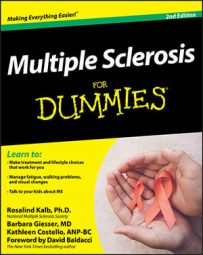Clinically isolated syndrome (CIS) can indicate the possibility of multiple sclerosis (MS), but it can’t be used solo as a tool to diagnose it. CIS is a first clinical episode lasting at least 24 hours that is caused by inflammation and demyelination in the CNS. One episode alone doesn’t meet the MS criterion for dissemination in time.
A person with CIS can have a single neurologic sign or symptom (for example, an attack of optic neuritis) that’s caused by a single lesion, or more than one sign or symptom (for example, an attack of optic neuritis accompanied by weakness on one side) that results from lesions in more than one site. A person who experiences a clinically isolated syndrome may or may not go on to develop MS.
So, if Susie goes to the neurologist with a single attack of optic neuritis, the doctor’s challenge is to determine what the chances are that she’s going to experience a second demyelinating event in the future (which would fulfill the diagnostic criteria for MS).
Neurologists know from CIS studies that when a person with CIS also has brain lesions on an MRI scan that are similar to those seen in MS, the patient has a high risk of a second demyelinating event, and therefore a diagnosis of MS, within several years. They also know that the more lesions there are, the higher the risk.
However, individuals who experience CIS with no brain lesions on an MRI scan are at relatively low risk for developing MS over the same time period. This means that the neurologist is going to look carefully at Susie’s brain MRI — and repeat it over time — to help figure out the next steps to take.
To date, four large studies have been carried out (and two more are under way) to determine whether early treatment of CIS delays the second demyelinating event and therefore the diagnosis of MS.
So far, each of the interferon medications — Avonex and Rebif (interferon beta-1a), Betaseron and Extavia (interferon beta-1b) — as well as glatiramer acetate (Copaxone) have been shown to delay the second demyelinating event. Avonex, Betaseron, Extavia, and Copaxone have been FDA-approved for this use. The manufacturers of Rebif have submitted an application to the FDA for approval of Rebif to treat CIS.
As with many other situations in MS, there are no right or wrong answers when it comes to treatment of CIS. Some people are ready to begin an injectable medication this early in the game — before the diagnosis has been confirmed — while others aren’t. The best strategy is to review your options thoroughly with your neurologist.

